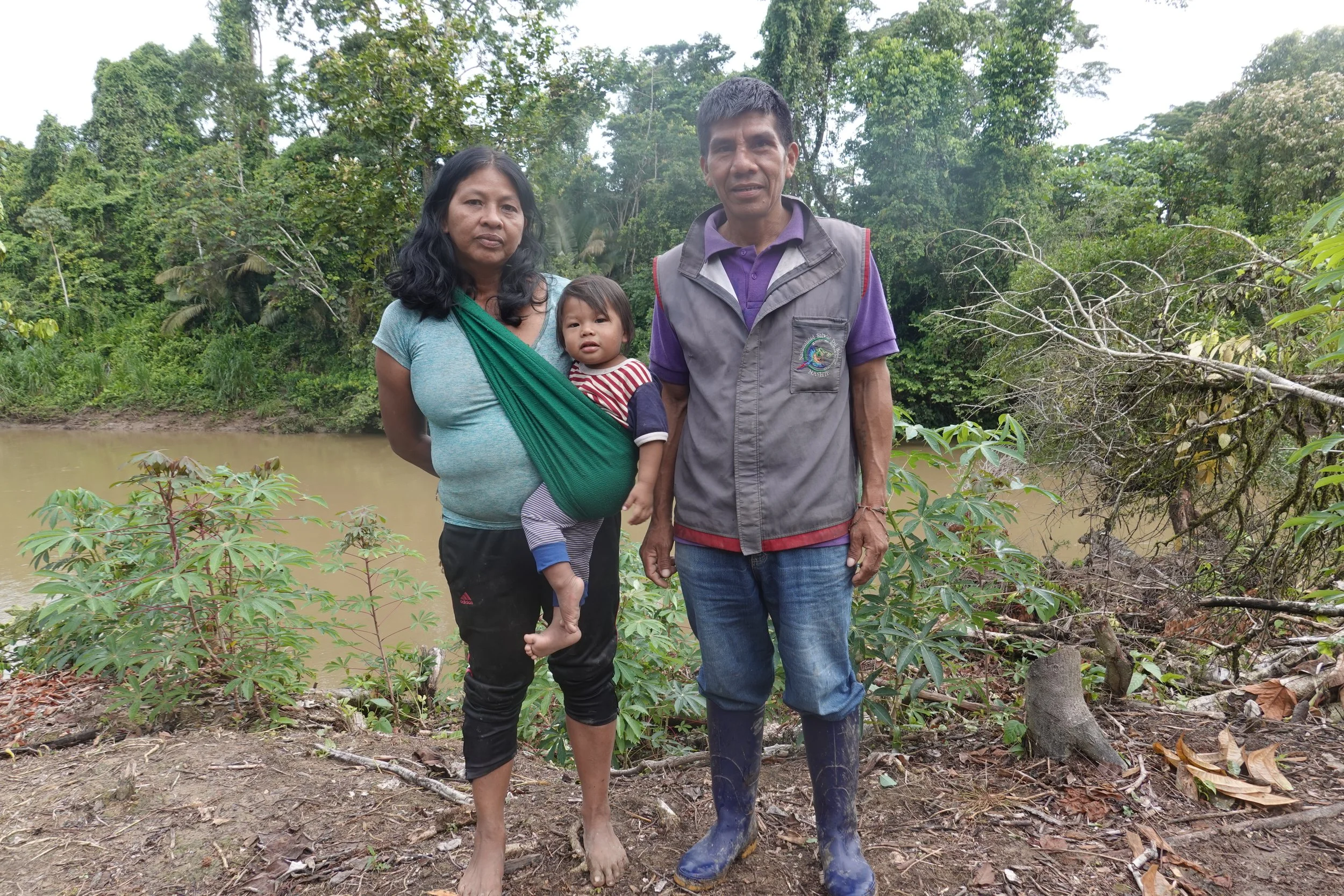by Sara Dykman
I counted our names on my hand. Nenquerei (aka Elias). Kira. Eli. The boat driver. Myself. That was five. Five of us were soon to be floating down the Curaray River in eastern Ecuador. I looked at my calendar. If we left on November 9th and returned on Nov 24th, that would put us 16 days on the river. Nenquerei, our guide, told us that we could buy plantains and yucca en route. Any other food we wanted needed to be bought, so prior to launch we headed to Puyo - Pastaza, Ecuador’s capital and gateway to the Amazon - to stock up.
Kira and I slept on our guide’s roof after shopping for enough food to last 16 days. We also organized our own gear and hoped we were bringing the right stuff.
We pinballed between the shops of Puyo. The hardware store had the sheet of plastic and fish hooks we needed. It took three small shops to gather five pounds of peanut butter, two squeezable bags of jelly, and more than a dozen bags of cracker cookies (were they crackers or cookies!?). We picked up a liter of oil, a pound of salt, three pounds of raisins, instant coffee, and way too much ketchup (I mistakenly thought it was tomato paste). We chose the biggest cabbage we could find, along with other veggies easy to store. We were counting on the carrots, garlic, potatoes, and onions to spruce up our meals. The pounds of lentils, pasta, and oatmeal would hopefully keep us full. We bought 36 eggs, knowing we would need to eat them early on. We also bought fifty pounds of rice.
“We need fifty pounds of rice?” I was certain I’d misunderstood Nenquerei.
“Si, si, si!!!” he assured me. His inflection made every word of Spanish an exclamation.
“Cincuenta libras?” I asked again. Fifty pounds was more rice than I had eaten last year.
“Si, si, si!!!” he confirmed as I handed the shop owner $24 dollars cash.
“What about some fruit?” I asked Nenquerei in Spanish. “Do we even have room?” I didn’t want our boat to sink.
“Si, si, si!!!” he replied. I crossed my fingers as Kira and I picked out a dozen yellow pitahayas. Even if the entire plan fell apart, at least we could feast on our new favorite fruit.
The pitahayas came in handy for more than just a tasty fruit snack. They made very good hats.
--
Twenty four hours later we were layering bags of rice, pitahayas, and our other provisions into a boat. Kira, Eli, and I kept looking at each other in disbelief. While planning, we had come up against so many dead ends and false starts. I had been mentally prepared for total failure. I had put our chances of finding a boat at 50%.
“We might just pull this off,” I said, wide-eyed with astonishment.
Packing the boat was a victory, even if it was less than ideal.
If it had been up to me, I would have found two small boats so that Kira, Eli, and I could’ve enjoyed the freedom to navigate on our own. The draw of adventure, for me, is tied to using my body to do the hard work of moving forward. I crave the satisfaction of self-propelled arrivals.
Swishing the mud off my boots and climbing in, it was obvious we were not going to be piloting the 24-foot long boat. The boat driver, Gonzalo, had climbed into the stern, alongside his wife (I guess she was coming too), a few jugs of gas and a motor. I had been assured we would only use the motor on the up-river return. Nenquerei stationed himself at the bow. He held steady, a confident captain, as the rest of us fidgeted.
Nenquerei would also be at the front of the boat.
I grinned at Kira and Eli. Despite the lack of self-sufficiency, we had made it. We were in a boat we didn’t think we’d find. Said boat was filled with 200 pounds of gear, including the many water filters and stoves we had deliberated over. We had an Indigenous Waoroni guide, despite having spent the previous month thinking he had ghosted us (he had actually gone to his community for several weeks and hadn’t had cell service). We had permission to enter Waoroni land, after all our other permits had failed us.
I shook my head in disbelief. I couldn’t believe we were here. I also couldn’t believe that in the whirlwind of departure Gonzalo’s wife, Nenquerei’s wife, and Nenquerei’s infant son had decided to come along as well.
The additions to the team had occurred less than an hour before we left to drive to the river. After eating lunch, I joked that I wished Nenquerei’s wife, Nemoneya, could be our cook, since her food was delicious. Her reaction had been to agree.
I was skeptical. They had seven kids, and I already felt bad about leaving them without their dad for two weeks.
“What about your baby? I asked, “He is still breastfeeding.”
They just laughed at me, gave their older kids money for food, and explained that the baby, Pigemo, was coming too.
Our team now included seven adults and one baby.
“A baby!” I reminded Eli and Kira, in case they hadn’t grasped the hilarity of the situation. They chuckled in unison.
Nemoneya, Pigemo, and Nenquerei.
The back of the boat… a typical scene. After the first day, we stopped using the motor, which was a relief. We also picked up the boat driver’s young daughter, so our “baby count” doubled.
The grumble of the motor interrupted the miracle of being on the boat. It had been a concession to give up the freedom of being in control. It had been a concession to give up the freedom of paddling. Nenquerei had appeased me by assuring us we would float downstream without the motor. The vibration from the engine and the smell of gas were an affront. Kira caught my eye, giving me a look that acknowledged my utter disappointment.
Disappointment followed me as we navigated the river. The current was the perfect canvas for a canoe adventure, and we were wasting it. Our boat plowed through the river and the grating engine blasted away any chance of a peaceful ride. I longed to drag a paddle at just the right angle so boat and eddies could dance together. I asked Nenquerei what was going on. He explained that we would only use the motor for the first day, as we had gotten a late start. Go with it, I told myself.
Go with it, I told myself again, as we set up camp on a sandbar. Sand wasn’t the most promising setting to find frogs, but our first day was just that. With wooden poles, vines (both collected across the river), and our sheet of plastic we situated our camp on the beach. Then we laid out what little we had for a bed. It wasn’t cold, so we each had only a thin blanket. I wished we had brought tents, but all our research had convinced us to bring hammocks. Hammocks didn’t work without trees, and any trees we could see were blocked by a wall of palms. Hard, wet sand wasn’t ideal, and I hoped we could camp in the forest the next day.
Our first campsite was on a sandbar, far (when there is a wall of palms) from the jungle.
Before the sun went down we gathered soggy firewood and began to boil the coffee-colored river water. We cut up veggies and cooked them with rice, eggs, and a few accidental pinches of sand. Belly full, my confidence was renewed. It’s just the first day, I reassured myself. Just go with it.
After our coalition of guides had gone to bed and the sun had settled out of view, Kira, Eli, and I trekked up the beach. It was a relief to be independent, even if it was just for a walk along the sand. It was a relief to be looking for frogs, even if we were searching a sandbar, just out of reach of the jungle. “Tomorrow we will ask to go motor-less,” I pledged. “And camp in better amphibian habitat.”
Then all our misgivings were put on hold.
“Toad” cheered Eli.
Our first frog!
Sitting in a trough of sand was the answer to why we were making so many concessions. We exulted in our find. Our exclamations were that of little kids. Marine toads were common, but this was a victory. We were finally finding frogs.
Complaints forgotten, we delighted in the toad’s pebbled skin, which was an artist’s rendition of his habitat. We stared into his eyes, painted like a universe, as he stared straight ahead.
A frog painted like sand.
We had four guides, an infant for company, 50 pounds of rice, a bed made of sand, a frustrating reliance on others, AND we had frogs.
The toad was our victory. We had two more weeks to find more. And more was the only motivation we needed.








